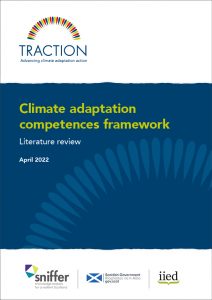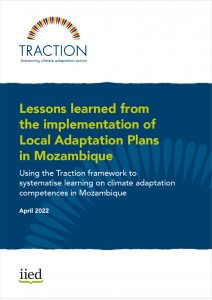About Traction
What is Traction?
Traction provides a framework for advancing climate adaptation action, based on systematic and shared understanding of enablers of change.
The five enablers within the Traction framework – policy and leadership, governance, synthesis, collaboration, and ethics and justice – relate to technical capacity, legislative authority and inter-institutional systems that help to bring about change rather than organisational or individual capabilities.
The Traction framework:
- aims to support understanding of what is helping and hindering adaptation progress that has positive and just impacts across society
- can be used at a range of entry points – as a means for setting intentions, as a design tool, or as a stocktake within an adaptation process for reflection and evaluation. It can be used by governments or funders to review whether investments are contributing to enablers of adaptation action
- is relevant at a range of geographic scales – national, regional and local – and in both the global North and global South
- is relevant for a wide range of users including place-based partnerships, national and regional government, fund managers and researchers and intermediaries
- provides a tool to facilitate peer-to-peer learning and could form the basis of an international learning exchange.
The framework focuses on enablers but recognises and brings to light maladaptation and undesirable aspects of adaptation. It also offers a framework to explore difficult discussions including around loss and damage, and can help to identify priorities when making complex decisions. It helps to challenge assumptions that adaptive capacity increases over time and responds to the importance of being able to track progress across time by different groups in society.
Who is the Traction framework for?
The intended users of the framework include:
- National government policymakers in the Global North and Global South
- Regional government
- Place-based partnerships including regions, cities, provinces, districts, municipalities, islands and localities
- Community groups involved in climate action
- Fund managers and fund administrators
- Researchers
- Intermediaries working across users and with community groups
How does the Traction framework align with global agreements?
The Traction framework offers a powerful means to plan and review progress towards adaptation action in line with global, national and local agreements and policies. The enablers converge with the adaptation action attributes in the Paris Agreement including the importance of:
- Integrating adaptation into relevant socioeconomic and environmental policies and actions
- gender responsive, participatory and fully transparent approaches
- consideration of vulnerable groups, communities and ecosystems; based on and guided by the best available science and, as appropriate, traditional knowledge, knowledge of indigenous peoples and local knowledge systems.
The Traction framework offers a tool to support advancing adaptation action in response to the needs highlighted by the 2022 IPCC report on Impacts, Adaptation and Vulnerability for coherence, transformation and the recognition that climate change action is everyone’s business, emphasising the interdependence of climate, biodiversity, environment and human societies to work towards:
- Linking disaster risk reduction, poverty reduction, environmental and climate mitigation with climate change adaption and implementing mitigation and adaptation together in support of sustainable development for all as climate resilient development
- Closing the adaptation gap by moving beyond short-term planning to developing long-term, concerted pathways and enabling conditions to ensure timely and effective implementation
- Tackling all the different challenges involves everyone – governments, the private sector, civil society – working together to prioritize risk reduction, as well as equity and justice, in decision-making and investment
- Integrating knowledge between the natural, social, economic and sciences, and integrating knowledge across the traditional and indigenous communities and local knowledge
How has the Traction framework been developed?
Traction has been funded by the Scottish Government, and developed by Verture (previously known as Sniffer) and IIED.
An initial framework for climate adaptation competences was developed through a literature review of academic, policy and practice literature. This framework was then piloted at a national level in Scotland and Malawi in 2018 and 2019.
Throughout 2021 further research to test and refine the Traction framework was carried out at a local and regional scale in Malawi (Southern Region – Balaka, Chikwawa, Machinga and Zomba Districts) and Scotland (Outer Hebrides), and at a national scale in Mozambique.
The Traction project team is:
- Ruth Wolstenholme, Verture
- Anat Prag, independent consultant
- Ben Connor, Verture
- Simon Anderson, IIED
- Leslie Mabon, Open University
With thanks to the following partners who have contributed to the development and testing of Traction:
- Outer Hebrides Community Planning Partnership Climate Change Working Group
- Trocaire
- Evidence for Development Consulting
- Climate Challenge Programme Malawi partners
– Catholic Development Commission (CADECOM) Chikwawa
– CADECOM Mangochi
– CADECOM National
– Centre for Integrated Community Development (CICOD)
– Churches Action in Relief and Development (CARD)
– Civil Society Network on Climate Change (CISONECC)
– Eagles Relief and Development (Eagles Relief)
– Zomba Diocese Research and Development Department (ZARDD) - Government of Mozambique, Ministry of Land and Environment
- Professor Luis Artur, Eduardo Mondlane University
If you are interested in finding out more about Traction, or using the framework, please contact Ruth Wolstenholme, Sniffer.



